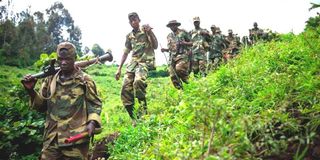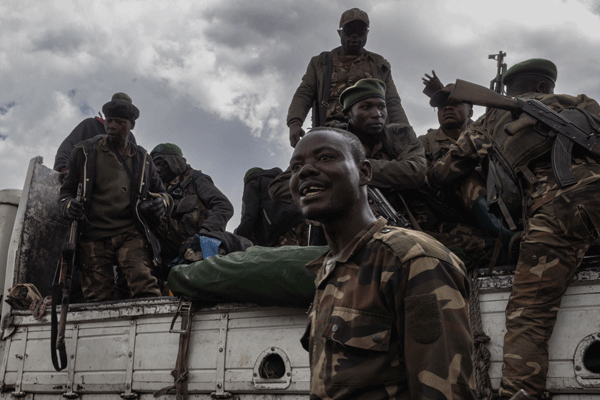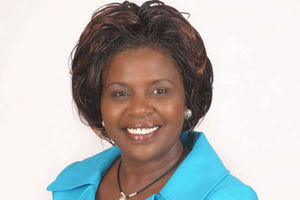AU appeals for ceasefire as rebels advance in DR Congo

M23 rebels withdraw through the hills from Karuba in eastern Democratic Republic of Congo on November 30, 2012. Rwanda has denied backing the fighters.
What you need to know:
- All parties, they said, should "respect international law, the safety and security of civilians and the stability at the borders of all countries in the region".
Addis Ababa,
African Union officials have appealed for an end to the growing violence in the Democratic Republic of Congo, a day after rebels made further progress there and Kinshasa expelled Rwanda's ambassador.
In their statement, the AU officials called for an immediate ceasefire.
All parties, they said on Sunday, should "respect international law, the safety and security of civilians and the stability at the borders of all countries in the region".
The DR Congo government said on Saturday it was expelling Kigali's envoy over what it said was Rwanda's backing for the M23 rebels making fresh inroads in the east of the country.
Rwanda denies
Rwanda, which denies the accusation, on Sunday expressed regret at the decision, adding that its troops at the two countries' border were on "high alert".
The AU on Sunday urged all the parties to engage "in a constructive dialogue" to ensure peace in the troubled region, calling them to peace talks in Nairobi next month.
Angola's President Joao Lourenco said he would dispatch his Foreign Minister Tete Antonio to DR Congo to mediate the dispute.
But Kinshasa's announcement late Saturday suggests they have lost patience with regional mediation efforts.
In recent days "a massive arrival of elements of the Rwandan element to support the M23 terrorists" against DR Congo's troops had been observed, said government spokesman Patrick Muyaya.
Condemning what he described as a "criminal and terrorist" adventure, he announced the expulsion of Rwanda's envoy Vincent Karega.
M23 advance
Hours earlier, reports had come in that the M23 rebels had seized more territory in the vast mineral-rich DRC, prompting the UN peacekeeping mission to increase its "troop alert level" and boost support for the army.
The longrunning dispute has already been the object of several regional peace initiatives, including one by the seven nations of the East African Community (EAC) coordinated by former Kenyan president Uhuru Kenyatta.
Kenyatta said on Sunday he was "profoundly concerned" by the escalation of conflict and the resulting humanitarian crisis.
The EAC, he said, called for an end to the fighting and unhindered access for aid work.
Hours after Kinshasa's announcement late Saturday, UN Secretary-General Antonio Guterres said he was trying to reach both DR Congo President Felix Tshisekedi and Rwandan President Paul Kagame.
Indiscriminate strikes
The UN peacekeeping mission MONUSCO meanwhile condemned the latest advance by the M23 rebels at Kiwanja and Rutshuru in the east, saying their "indiscriminate strikes" were hitting the civilian population.
M23, a mostly Congolese Tutsi group, resumed fighting in late 2021 after lying dormant for years, accusing the government of having failed to honour an agreement over the demobilisation of its fighters.
It has since captured swathes of territory in North Kivu, including the key town of Bunagana on the Ugandan border in June.
Relations between Rwanda and DR Congo have been strained since the mass arrival in the eastern DRC of Rwandan Hutus accused of slaughtering Tutsis during the 1994 genocide in Rwanda.
Kinshasa has regularly accused Rwanda of carrying out incursions into its territory, and of backing armed groups there. Kigali has denied involvement.





